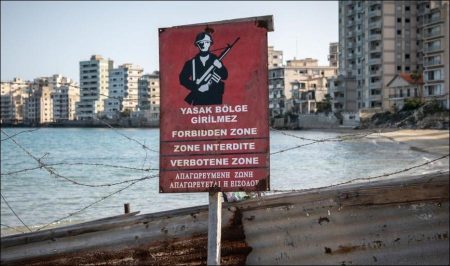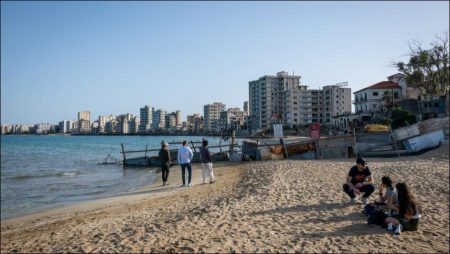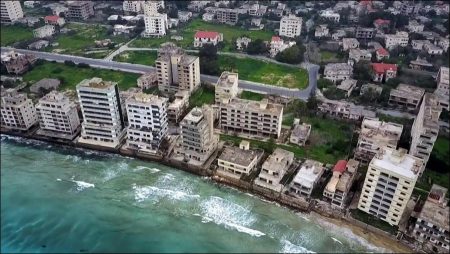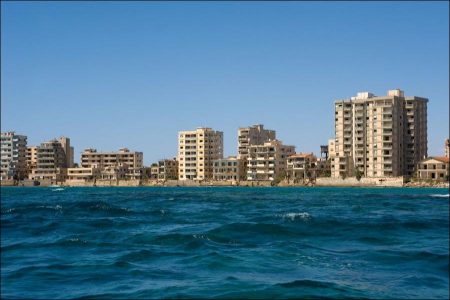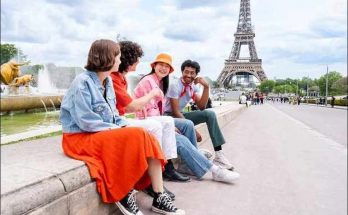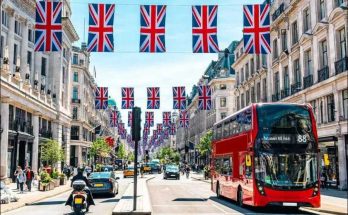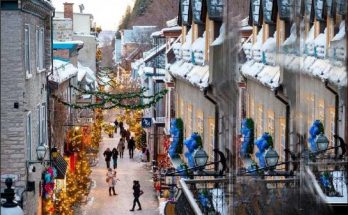Welcome to Varosha, the hidden coast of the Mediterranean Sea. On sandy beaches stretching for miles, you are completely alone with nature. Dozens of large hotels where you can choose the room you want, stretches repeatedly.
But before you go, remember to take a bolt cutter with you to cut the thick wires you will encounter as you approach the beach. Attention is also paid to military patrols ordered to kill people seen in the forbidden zone.
Before the division of Cyprus in 1974, Varosha (Maras in Turkish) was the shore resort of Famagusta. The region, which has the best beaches of the island, was a region where rich and celebrities flocked. Richard Burton and Brigitte Bardot were seen on these shores. Elizabeth Taylor’s favorite was said to be the Argo hotel on Kennedy Boulevard.
Vasia Markides, a 34-year-old American citizen of Greek Cypriot origin, whose mother was born and raised in Marash, said, este Anyone who comes out of Marash has a romantic look to the past. “he says.
But 40 years ago, the long years of communal violence after the island, a coup in support of the junta in Greece organized, followed by Turkey, has done military forces on the island’s north and where the lands were seized.
As Turkish soldiers approached Marash, where the Greeks lived, the people of the city fled with the intention of returning when the situation calmed down. However, Maraş was surrounded by wires by Turkish troops and since then it has become a ghost town.
A UN resolution issued in 1984 envisaged the surrender of Marash to the control of the organization. Anybody other than those who were forced to leave the city was forbidden to settle in the area.
One of the fleeers of Varosha was Emily, Markides’ mother. She just got married. Wedding gifts stood in the attic when the family left the house. Others told us that the cooking pots left while cooking in the fire, that life just froze.
“A post-apocalyptic nightmare”
For the first time in 2003, travel restrictions between the two sides were lifted. Cypriots from both sides were allowed to pass through the UN-controlled buffer zone, known as the “Green Line”.
Vasia Markides, who visited her family’s house for the first time, said that she had lived, “The image I dreamed was like a paradise. But it was like a nightmare after the apocalypse. trees were coming out of it. It was a ghost town. ” he explains.
Maraş’ı surrounding wires, curiously looking at the forbidden area of tourists “photos and movies are prohibited,” reminding signs are hung. Those who cross the wires may face the danger of death. People who used to live in Maraş often attach love letters and flowers to barbed wires.
Except for Turkish soldiers, there are very few who can enter Maraş. The entrants tell us that they have seen extraordinary images. In an auto gallery, 1974 model cars are still seen, clothing stores showcases outdated garments, sand dunes seized along the coast are rare nests of sea turtles are told. Photographs depicting Maraş’s misery are surfing the internet, but those who take the pictures don’t say that they took them. Everything valuable in Marash has already been looted. The infrastructure of the region has been damaged beyond repair.
The dream of making Varosha an eco-city
But Markides has big plans for Marash. “From the moment I saw Marash, I had the desire to revitalize this place. You can see the energy, the things that can be done once in the region.” says Markides.
Vasia Markides, who currently lives in New York, is leading the proposal to turn Marash into an ‘ecosystem’ and to create a model of sustainability and peaceful coexistence. Markides’ plans are supported by the Greek and Turkish parts of Cyprus. And in the framework of this work, unexpected friendships develop.
Born and raised in a house overlooking Varosha, 34-year-old Ceren Boğaç, “We were like neighboring ghosts. There were flower pots, curtains in the houses, but no one lived inside. It was a place to go.” says. Ceren’s school was next to Varosha’s fences. Accidentally hitting the ball too hard, the ball goes too far, it would not be possible to run and get.
Ceren Boğaç’s grandparents are from Larnaca in southern Cyprus. In return for the house they had to leave, they were given the home of a Greek family. Ceren Boğaç grew up in that house. But when he was 5 or 6 years old, he found something to bother him.
“One day I found some personal belongings in a box. Photo albums, updates … I asked my grandmother, who they belonged to. She answered me, ‘This is the real owner of the house’. That is the first time we have experienced this. I realized that the house was not ours. ” he explains.
Ceren Boğaç continues: “I was shocked. I started to think about how this happened. Why did these people leave their homes? What did they feel when they ran away from their homes? What was the situation that would require their children to leave their toys, photo albums and everything behind?”
This fact, which she revealed when she was a child, determined Ceren Boğaç’s whole professional life. She studied psychology and architecture in order to understand how people living in someone else’s home had an impact.
A haunting city
During her research, she watched the documentary “Hidden in the Sand”, shot by Vasia Markides in 2008, where the Greeks and Turks of Maghreb told the Turks what they thought of the division.
Boğaç sent an e-mail to the director of the documentary and then started to correspond. One day Markides phoned and asked: “Are you still interested in Marash? Because I can’t forget this.”
Ceren Boğaç replied, “Yes, I never mind.” And then they started exchanging ideas on how to improve the situation. This is how Famagusta Ecocity Project started. The goal is to transform Maraş into a model for green technologies.
Referring to the capture of wildlife Varosha, Markides, “We need to pay attention to the signs given by nature. Instead of relying on fossil fuels, we need to use solar energy, which is too much in Cyprus. This is a great opportunity for us. All the hotels built on the coastline in the 1970s prevented the sun from hitting the beach after 1 o’clock. ” says.
The project is being launched these days. Markides will also start filming a documentary about efforts to transform the Famagusta region into a thriving ecosystem.
On Thursday, an architectural design studio will be opened overlooking the ghost town, where local and international experts will begin planning a sustainable future.
Are barbed wires overcome?
But in front of the project, there is still a roughness: barbed wires and patrolling soldiers… As the division of Cyprus continues, Varosha seems to remain behind barbed wires. The most important point that requires a solution in order to reach agreement between the parties is land arrangements. The full return of goods received from Greek Cypriots will require resettlement of many Turkish Cypriots.
Almost all of the buildings in Maraş behind barbed wires belong to Greek Cypriots. And no one lives in these buildings. The Greek Cypriots argue that the return of Marash to them would be a positive “confidence building measure” so that the peace talks that have been suspended since March 2012 can resume.
We have to do something about this city. Famagusta ecocity is Project located economist Fiona Mullen, “this is a sensitive issue. Varosha’s extradition, even though the Greek Cypriots, Turkey will make a huge change in perception, Turks and Turkish Cypriots, they give back Varosha, the Greek Cypriots he is concerned that he will not pocket the return and give anything in return. ” says.
Therefore, Turkey and the Turkish Cypriots, “to be part of a comprehensive solution Maras broad” form takes the attitude. Ceren Boğaç, despite the high laths in front of them, is hopeful. “The problem in Cyprus is not politics. The problem is that we expect others to come and start something in our own country. But if we start such a move for the first time, we may be prepared for economic or financial development. We have to do something for this city.” says Taurus.
Vasia Markides shares the optimism of Boğaç. “I think it is a success, even if it takes a place that is the symbol of war, neglect, hatred and abandonment and turns it into a model that the whole world can use, providing only awareness and setting an example for other societies.” says.
Views: 338
